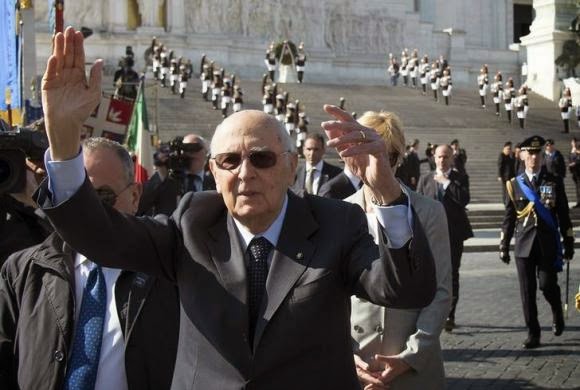Italian President Napolitano departs, setting challenge for Renzi
Italian President Napolitano departs, setting challenge for Renzi, Italian President Giorgio Napolitano handed in his resignation as head of state on Wednesday, leaving Prime Minister Matteo Renzi with the politically delicate task of finding a successor.
The 89-year-old Napolitano, widely respected outside Italy as a guarantor of stability during the euro zone crisis, had always been expected to step down before the end of his second term in office because of his advanced age.
With elections in Greece later this month and the European Central Bank under growing pressure to take unprecedented steps to fight the risk of deflation, the change adds to an increasingly uncertain climate in the euro zone.
Italy is struggling to emerge from years of recession and the government faces hurdles to its economic and constitutional reform agenda.
Renzi hailed Napolitano's contribution to ensuring political stability during nine turbulent years in office and said he expected a successor would be chosen by the end of the month.
Stalemate over selecting a new head of state could absorb precious political energy and, at worst, undermine Renzi to the point where he might try to re-establish his authority with an early general election.
Speculation has been underway for months over who will succeed Napolitano in an office with wide but loosely defined powers that range from naming prime ministers and vetoing laws to exercising general moral suasion over government policy.
No clear front-runner has emerged with potential candidates including former Prime Minister Romano Prodi, Economy Minister Pier Carlo Padoan and constitutional court judge Sergio Mattarella. ECB President Mario Draghi, once seen as a candidate, has ruled out leaving his current position.
Renzi declined to speculate on names but said the next head of state would be "a great arbitrator who will help the country to grow" and would be backed by as wide a majority as possible.
The new president will be elected in a secret ballot by both houses of parliament, plus representatives of the regions, in a complicated multi-round procedure.
Voting must begin within 15 days and is expected to start at the end of the month. The debacle in 2013, when political faction-fighting obliged Napolitano to step in as a compromise candidate, underlines how risky the procedure can be.
Renzi's center Democratic Party has about 450 voters in the 1,009-strong voting assembly, ensuring the prime minister should have the numbers eventually to elect his candidate without relying on help from major opposition parties.
But the real risk for Renzi may come from within his own party ranks, where some of the old guard may try to extract concessions from a prime minister they have always regarded with suspicion.
The 89-year-old Napolitano, widely respected outside Italy as a guarantor of stability during the euro zone crisis, had always been expected to step down before the end of his second term in office because of his advanced age.
With elections in Greece later this month and the European Central Bank under growing pressure to take unprecedented steps to fight the risk of deflation, the change adds to an increasingly uncertain climate in the euro zone.
Italy is struggling to emerge from years of recession and the government faces hurdles to its economic and constitutional reform agenda.
Renzi hailed Napolitano's contribution to ensuring political stability during nine turbulent years in office and said he expected a successor would be chosen by the end of the month.
Stalemate over selecting a new head of state could absorb precious political energy and, at worst, undermine Renzi to the point where he might try to re-establish his authority with an early general election.
Speculation has been underway for months over who will succeed Napolitano in an office with wide but loosely defined powers that range from naming prime ministers and vetoing laws to exercising general moral suasion over government policy.
No clear front-runner has emerged with potential candidates including former Prime Minister Romano Prodi, Economy Minister Pier Carlo Padoan and constitutional court judge Sergio Mattarella. ECB President Mario Draghi, once seen as a candidate, has ruled out leaving his current position.
Renzi declined to speculate on names but said the next head of state would be "a great arbitrator who will help the country to grow" and would be backed by as wide a majority as possible.
The new president will be elected in a secret ballot by both houses of parliament, plus representatives of the regions, in a complicated multi-round procedure.
Voting must begin within 15 days and is expected to start at the end of the month. The debacle in 2013, when political faction-fighting obliged Napolitano to step in as a compromise candidate, underlines how risky the procedure can be.
Renzi's center Democratic Party has about 450 voters in the 1,009-strong voting assembly, ensuring the prime minister should have the numbers eventually to elect his candidate without relying on help from major opposition parties.
But the real risk for Renzi may come from within his own party ranks, where some of the old guard may try to extract concessions from a prime minister they have always regarded with suspicion.

0 comments:
Post a Comment